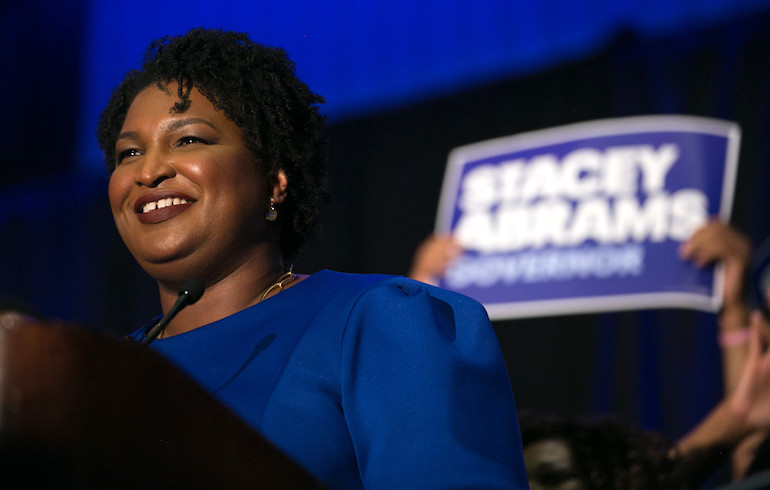A quirky twist for Israel in Stacey A’s Geogia win
In Georgia’s battle of the Staceys, Stacey Abrams, the state’s onetime House minority leader, defeated former State Rep. Stacey Evans in the Democratic primary for governor. For the first time, an African-American woman is a major party candidate for Georgia governor.
Nationwide, the win is seen as a bellwether in the battle for the Democratic soul between progressives like Abrams, versus moderates represented by her opponent. As for the Israel wrinkle—
In a Jewish community debate in February, Abrams was asked about her 2016 vote against a bill strongly backed by Jewish groups. It would have penalized those who comply with the movement to boycott, divest from and sanction Israel.
Michael Jacobs, editor of the Atlanta Jewish Times, noticed something jarring about her response. Twice in a two-minute answer, she said, “I unequivocally believe in the right of Israel to exist.”
Jacobs was glad to hear it, but unnerved she had to say it. “In 2018, one of the leading candidates for Georgia governor sees Israel’s right to exist as an issue for debate, not an accepted reality,” he wrote. “I don’t think Abrams has any doubts about Israel’s existence, but her need to say it means she expects others in her progressive wing of the Democratic Party to disagree with her.”
After she launched her candidacy, Abrams appeared to anticipate blowback and outlined her Jewish credentials in a Medium post last November. She joined a black-Jewish retreat in 2003 organized by Project Understanding, the group that sustains the black-Jewish alliance forged in the civil rights era. But she could not vote for the BDS bill, she said, for the same reason that other progressives who oppose BDS oppose such bills: It brings government in as a referee on boycotts and free speech, which, she said, should trouble those steeped in the history of civil rights.
“While the instinct to use the imprimatur of the state to punish free speech, however abhorrent, is understandable — the law then becomes precedent,” she said. “Boycotts have been a critical part of social justice in American history, particularly for African-Americans.” (A few months later, 45 leading Jewish Georgians, including Frank, took to Medium to defend her argument as legitimate even if they disagreed with her.)
It’s an argument that’s going to continue. Louisiana this week became the 25th state to pass an anti-BDS law, and there are a number of legal challenges to such laws in the states that have them.

 47.0°,
Mostly Cloudy
47.0°,
Mostly Cloudy 




